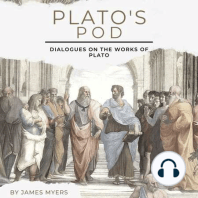115 min listen

Plato’s Timaeus Revisited, Part III: Perceiving Imitations of Being as they Become
Plato’s Timaeus Revisited, Part III: Perceiving Imitations of Being as they Become
ratings:
Length:
120 minutes
Released:
Nov 17, 2023
Format:
Podcast episode
Description
How does perception of shape relate to our understanding of time, when everything we see, touch, taste, smell, and hear is in a constant state of motion and change? The question occupied members of the Toronto, Calgary, and Chicago Philosophy Meetup groups on November 5, 2023 in reading the assertions of the astronomer Timaeus on the interplay of proportions and probabilities in a spherical universe with a soul circling around its middle. Beginning at 48(a) in the dialogue, Timaeus introduces the concepts of Necessity, a container for the limits of things in the process of Becoming, and the four fundamental physical elements of earth, fire, water, and air – the latter two of which intermediate the first two. What does all of this mean? And what came first in the universe: physical objects, or intelligence? We will pick up in our next episode where we left off in this, with triangles and the five Platonic solids.
Released:
Nov 17, 2023
Format:
Podcast episode
Titles in the series (59)
Dialogue on The Republic, Session 2: Social Constitution by Plato's Pod: Dialogues on the works of Plato